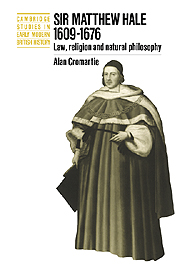Book contents
- Frontmatter
- Contents
- Acknowledgements
- Introduction: a summary life
- Part I Law
- 1 Coke: the appeal to reason
- 2 Selden: the appeal to contract
- 3 The rights of the Crown
- 4 Interregnum
- 5 Protectorate
- 6 Restoration: ‘the nature of laws’
- 7 Restoration: constitutional theory
- 8 Restoration: legal practice
- Part II Religion
- Part III Natural philosophy
- Conclusion
- Appendix: Hale and witchcraft
- Bibliography
- Index
- Titles in the series
6 - Restoration: ‘the nature of laws’
Published online by Cambridge University Press: 05 May 2010
- Frontmatter
- Contents
- Acknowledgements
- Introduction: a summary life
- Part I Law
- 1 Coke: the appeal to reason
- 2 Selden: the appeal to contract
- 3 The rights of the Crown
- 4 Interregnum
- 5 Protectorate
- 6 Restoration: ‘the nature of laws’
- 7 Restoration: constitutional theory
- 8 Restoration: legal practice
- Part II Religion
- Part III Natural philosophy
- Conclusion
- Appendix: Hale and witchcraft
- Bibliography
- Index
- Titles in the series
Summary
For Roger North (1653–1734), who wrote in the next century, there was a guiding thread to Hale's career: ‘[his principles] being demagogical, could not allow much favour to one who rose a monarchist declared’. His religion and his politics were very closely linked: ‘if one party was a courtier and well-dressed, and the other a sort of puritan, with a black cap and plain clothes, he insensibly thought the justice of the cause with the latter.’ In the Convention parliament, as the previous chapter made clear, Hale was associated with a ‘presbyterian’ line. It was very important to North, a Jacobite High Churchman, to show that Hale stayed loyal to his party, at worst as a republican in feeling, at best as a self-righteous and legalistic prig. North had inherited the notes of his elder brother Francis (1637–85), an Anglican loyalist advocate who was often in conflict with Hale. From their sectarian standpoint, Hale was a politician committed to the ‘faction’ that undermined the state. Their case was overstated, with the tinge of paranoia that disfigured Tory thought, but it offers an invaluable perspective. Hale tried to be the servant of the law, but the law that he believed in was highly politically charged.
- Type
- Chapter
- Information
- Sir Matthew Hale, 1609–1676Law, Religion and Natural Philosophy, pp. 89 - 97Publisher: Cambridge University PressPrint publication year: 1995



